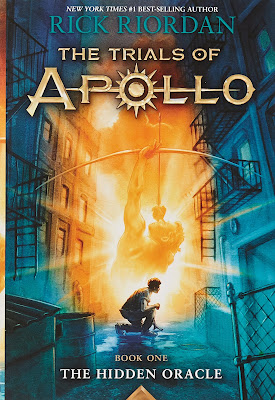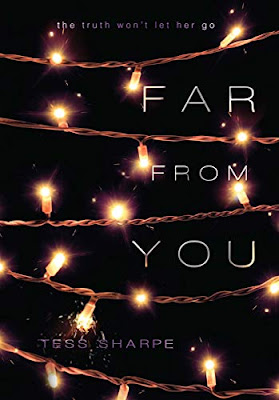Book Review: The Hidden Oracle by Rick Riordan
Goodreads Description: How do you punish an immortal?
By making him human.
After angering his father Zeus, the god Apollo is cast down from Olympus. Weak and disorientated, he lands in New York City as a regular teenage boy. Now, without his godly powers, the four-thousand-year-old deity must learn to survive in the modern world until he can somehow find a way to regain Zeus's favour.
But Apollo has many enemies—gods, monsters and mortals who would love to see the former Olympian permanently destroyed. Apollo needs help, and he can think of only one place to go... an enclave of modern demigods known as Camp Half-Blood.
My Review: Spoilers ahead for the book's main twist. Proceed with caution.
Here we are again, back with another Riordan book. I was expecting the usual delightful romp through the Percy Jackson universe, but was surprised to find The Hidden Oracle has a completely different vibe than previous installments, both in good and bad ways.
As punishment for indirectly aiding Gaea and the giants in their war against the Gods in the previous series, Apollo is cast down to Earth in mortal form and must reclaim the five Oracles that have gone mysteriously silent. Due to his circumstances, Apollo is not the jovial or wide-eyed protagonist that usually appears in the Riordanverse: he's irritable, arrogant, cowardly, and most importantly, an adult. While his memories are hazy enough that "Lester" is able to embody a somewhat juvenile perspective on the world, Apollo's characterization still feels like a bored adult being forced to endure this magical childlike adventure, and his cynicism at times brought me out of the fun of the story. It's hard to say if it's me, or Riordan, or his choice of protagonist (perhaps all of the above), but this book felt like it was bored of its own formula. It constantly tries to buck against its universe's well-cemented formula with differing levels of effectiveness, with Apollo's characterization being the most difficult change to climatize to. He does transform over the book, as well as the series, and his more grating traits are sanded down as he learns and grows. I have read the third book in this series (you can find my review for it here) and Apollo's arrogance, cowardice, and his negative attitude towards the quest are toned down to a much more tolerable degree by that point in the series. In this book, though, it can be a bit much. However, there's still a lot to like about this protagonist. Apollo, as a lover-not-a-fighter God, often tries to avoid solving conflicts with force, like previous demigod protagonists, and is often using music to overwhelm his enemies or advance his quest. As much as Apollo's attitude can be somewhat grating, it was refreshing to follow a pacifist character who will wander off in hilarious directions to avoid a fist fight, and whose creative approach to problem solving breathes new life into a series that has largely solved problems through finding different flavours of how to hit someone.
Apollo's characterization is far from the biggest formula shake-up. Historically, Riordanverse villains have been large, mythical beasts and creatures, and while The Trials of Apollo still features the existentialist monsters we know and love from Greek myth, the new series features a host of "god-emperors" to join the cast of baddies - real historical figures that have ascended to legend status due to their stories being told again and again. While previous Riordan books have featured humans or demigods working alongside the primordial baddies, the god-emperors from this series are "bosses" while previous humans and even demigods like Luke were treated and behaved more like disposable "peons" or "soldiers." These god-emperors are not only part of the problem, they are leading the problem, and this creates room to question the goodness of humans, the evil within monsters, and everything in between.
The book raises questions about the capacity of good and evil not only in its villains, but also in its protagonists. Meg, daughter of Demeter, is presented like no other demigod up until this point. Her story doesn't follow the typical pipeline of discovering powers-traveling to Camp Half-Blood-being claimed-establish self at camp-define oneself through questing. When Apollo meets her early on in the book, she already knows how to fight of monsters, has some conception of her powers and origin, and is content to survive in the urban jungles on her own than journey to a camp to be trained like a traditional hero. Meg presents as neurodivergent throughout the novel, from her antisocial tendencies, her lack of concern for hygiene, poor social skills, and odd behaviour, including behaviours that could be considered "stimming." Because she isn't a high-functioning charismatic attractive teenager, Apollo clearly doesn't like her and is even grossed out by her, but as time passes he grows to see past her presentation and comes to care for her compassion, tenacity, and resilience. Because she presents so differently than most other characters, Meg gives readers who may be neurodivergent themselves, or who may feel like the 'weird outcast,' a character they can really connect to. Many of Riordan's character, like Percy himself, are larger than life - a little too charismatic, a little too friendly and patient, a little too eloquent, a little too perfect. While these characters can be excellent aspiration models, it can be intimidating to compare your messy human self to a character so perfect. Meg's imperfections felt like a release of tension in comparison. It also creates a bit of mystery, as Meg doesn't always communicate her thoughts with Apollo or the reader, opening space to question her motivations by the time she comes to betray Apollo to Nero, one of the god-emperors. It's revealed that Meg was actually working alongside Nero throughout the entire book and her betrayal leaves the ending uncertain, a sort of cliff hanger that allows readers to wonder in what capacity Meg will return -- as a villain, as someone who needs rescuing, or as someone who need redemption? Only time, and pages, will tell.
All in all, I enjoyed The Hidden Oracle for what it was. I enjoyed the change-ups to the formula, and the honest attempt to scratch at good and evil while staying within the bounds of a middle grade formulaic novel, but these change ups both helped and hurt in many ways. Ultimately, it was Apollo's negativity and bitterness that dragged the vibe down and made it hard to enjoy the mythical romp.
TL;DR: 3/5 stars. A solid Riordan romp that changes up the formula to open up conversations on villains and heroes, good and evil.






